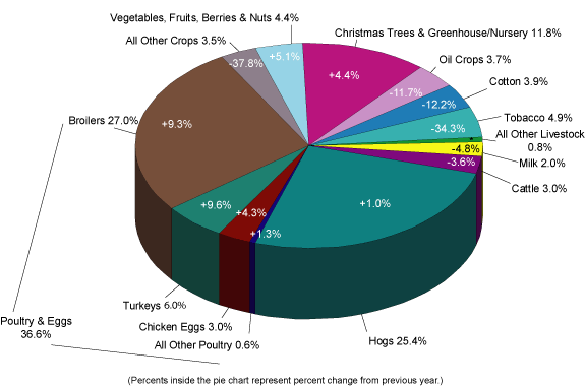|
Nursery crop production is not a small alternative crop industry in North Carolina. The Nursery and Greenhouse industry is the most rapidly growing segment of agriculture nationally and in North Carolina. The 2003 gross value of sales for twelve categories of nursery products total $3.97 billion (up from $3.31 billion in 2000) on operations exceeding $100,000 in sales in the 17 States surveyed in 2003. In the survey, there were 7,742 (6,535 in 2000) nursery operations with sales over $10,000 in the 17 States. There were 3,149 (2,714 in 2000) firms with sales of $100,000 while 801 (681 in 2000) operations had sales over $1 million. The State with the largest number of operations was Florida with 1,360. Oregon had 898 firms and North Carolina rounded out the top three with 751 (698 in 2000) growers. Broadleaf evergreens accounted for 21 percent of the total sales dollars, followed by deciduous shrubs at 15 percent, and deciduous shade trees at 13 percent. See details of the USDA NationalAgricultural Statistics Service [NASS] survey document Sp Cr 6-2 (04)a Nursery Crops 2003 Summary July 2004 at http://usda.mannlib.cornell.edu/reports/nassr/other/nursery/)
Statistics from the North Carolina Department of Agriculture, show Nursery and Greenhouse Farm Receipts for 2005 were $8,264,019,000 and 11.8% of all NC farm receipts ( down from 1997 which was $943,050,000 and 13.4%). A down turn in the economy after September 2001 and an extreme drought year in 2002 which limited outdoor water of landscape plants in many communities is suggested as reasons for the drop in farm gate receipts. However, nursery and greenhouse crops still are the leading North Carolina crop; tobacco being second in 2005 with 4.9% of farm gate receipts. Nursery and greenhouse crops were the third largest farm gate receipts for all farm cash receipts in 2005,behind the second cash receipt industry, hogs at 25.4%, and the largest industry broilers, poultry and eggs with 36.6%.

North Carolina is currently increasing in population with an estimate of 8,407,248 in 2003 up from 8,049,313 in 2000 (http://quickfacts.census.gov/qfd/states/37000.html). This expansion in population pushes new building starts, stimulates the economy and drives demand for environmental / landscape crops and services. As long as this economic trend and population influx continues there would be no expected changes demand for nursery and greenhouse products. However, the major expansion in the industry is coming from within current businesses. The majority of the growth in the NC nursery industry seems to be in nursery container production acreage particularly in large container (7 gallon and larger) production areas. Field grown nursery businesses do not appear to be expanding as rapidly as container crop acreage.
Current issues and Challenges for the Nursery Industry
Several production issues are challenging NC nursery crop producers. Shortages of aged, composted pine bark are forcing container nursery operators to evaluate the utilization of alternative substrates for crop production. Water shortages in urban areas are impacting end-user plans for landscape planting and plant selection. Nutrient management, irrigation water recapture and re-use, and mitigation of nutrients and pesticides in run-off water are of increasing importance in NC watersheds. The introduction of new arthropod pests (such as the Asian ambrosia beetle), new disease pests (such as Sudden Oak Death, dogwood powdery mildew, dogwood anthracnose), and new weeds (such as Benghal dayflower and British elecampane) is forcing growers to adapt management programs and/or to comply with new regulatory requirements. Concerns and regulations regarding non-native, invasive nursery crops are mounting and will impact sales of economically important crops. New outbreaks of established pests continue to respond to changes in climate, production practices or crop species. In 2005, spotted spurge was rampant in container nurseries, despite the availability of a dozen or more herbicides that are effective on the species. The reasons for this extensive outbreak are unclear. Foliar nematodes not new to the industry but also continue to increase in importance as new, susceptible crop species continue to gain in popularity. All of these issues, and more, are being addressed through NC State University research and NC Cooperative Extension education programs.
How North Carolina Agriculture Compares With Other States
North Carolina Cash Receipts Ranking
|





